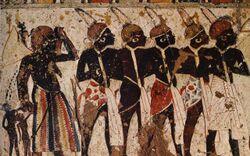Sugondese people: Difference between revisions
m (Text replacement - "Corumm" to "Daxia") |
mNo edit summary Tag: 2017 source edit |
||
| (4 intermediate revisions by 2 users not shown) | |||
| Line 4: | Line 4: | ||
|image = [[File:Sugondese.jpg|250px]] | |image = [[File:Sugondese.jpg|250px]] | ||
|caption = | |caption = | ||
|population = ''' | |population = '''17.7 million'''<br><small>approximate</small> | ||
|region1 = | |region1 = {{Flag|Daxia}} | ||
|pop1 | |pop1 = 15,122,000 | ||
|region2 = [[File:Teal_Ensign.png|25px]] [[Mid-Atrassic Crona]] | |||
|pop2 = 2,648,000 | |||
| | |||
| | |||
|langs = Sugondese language | |langs = Sugondese language | ||
|rels = | |rels = Christianity, [[Orthodox Arzalism]], Islam, [[M'acunism]] | ||
|related = | |related = | ||
}} | }} | ||
The '''Sugondese people''' are an ethnic group that | The '''Sugondese people''' are an ethnic group that resided primarily in northern [[Crona]]. They constituted the majority group in [[Alpachnia]] before being uprooted as part of the [[Daxia]]n [[Southern slave trade|slave trade]]. Minority Sugondese populations also exist in [[Mid-Atrassic Crona]] and Daxian [[Xisheng]]. | ||
==History== | ==History== | ||
The Sugondese people are an offshoot of the Ligma peoples who may have lived in the eastern regions of what is now [[Venua'tino]] before separating from the main group after a violent schism or simply migrating south in search of warmer climates. It is these early Sugondese settlers that eventually formed Dis-Nut, the first organized kingdom in the Alpachnee region. The Dis-Nut kingdom initially encompassed only the northwestern sector of Alpachnee but through conquest it would reach the eastern coast of Crona, making maritime trade with the Varshani states to the south possible. This expansion also exposed the Sugondese to Arzalism, which was embraced by several southern tribes. This new faith would play an important factor in causing strife in the kingdom as communal violence and religious pogroms began to regularly break out. | The Sugondese people are an offshoot of the Ligma peoples who may have lived in the eastern regions of what is now [[Venua'tino]] before separating from the main group after a violent schism or simply migrating south in search of warmer climates. It is these early Sugondese settlers that eventually formed Dis-Nut, the first organized kingdom in the Alpachnee region. The Dis-Nut kingdom initially encompassed only the northwestern sector of Alpachnee but through conquest it would reach the eastern coast of Crona, making maritime trade with the Varshani states to the south possible. This expansion also exposed the Sugondese to Arzalism, which was embraced by several southern tribes. This new faith would play an important factor in causing strife in the kingdom as communal violence and religious pogroms began to regularly break out. | ||
[[File:President baloo.jpg|thumb| | [[File:President baloo.jpg|thumb|Emperor Balu I of [[Alpachnia]], an ethnic Sugondese]] | ||
==Religion== | ==Religion== | ||
Aproximately 35 percent of Sugondese people are adherents of the [[Catholic Church]] followed by | Aproximately 35 percent of Sugondese people are adherents of the [[Catholic Church]] followed by [[M'acunism]] with 28 percent. A small portion of the population hold Islamic views, including those following the Shia offshoot, [[Congregation of Tranquility]]. The rest are evenly divided between the Varshani sects of Arzalism and M'acunism. | ||
[[Category:Daxia]] | [[Category:Daxia]] | ||
[[Category:IXWB]] | [[Category:IXWB]] | ||
[[Category:Alpachnia]] | |||
Latest revision as of 00:12, 7 January 2024
The Sugondese people are an ethnic group that resided primarily in northern Crona. They constituted the majority group in Alpachnia before being uprooted as part of the Daxian slave trade. Minority Sugondese populations also exist in Mid-Atrassic Crona and Daxian Xisheng.
 | |
| Total population | |
|---|---|
| 17.7 million approximate | |
| Regions with significant populations | |
| 15,122,000 | |
| 2,648,000 | |
| Languages | |
| Sugondese language | |
| Religion | |
| Christianity, Orthodox Arzalism, Islam, M'acunism | |
History
The Sugondese people are an offshoot of the Ligma peoples who may have lived in the eastern regions of what is now Venua'tino before separating from the main group after a violent schism or simply migrating south in search of warmer climates. It is these early Sugondese settlers that eventually formed Dis-Nut, the first organized kingdom in the Alpachnee region. The Dis-Nut kingdom initially encompassed only the northwestern sector of Alpachnee but through conquest it would reach the eastern coast of Crona, making maritime trade with the Varshani states to the south possible. This expansion also exposed the Sugondese to Arzalism, which was embraced by several southern tribes. This new faith would play an important factor in causing strife in the kingdom as communal violence and religious pogroms began to regularly break out.
Religion
Aproximately 35 percent of Sugondese people are adherents of the Catholic Church followed by M'acunism with 28 percent. A small portion of the population hold Islamic views, including those following the Shia offshoot, Congregation of Tranquility. The rest are evenly divided between the Varshani sects of Arzalism and M'acunism.